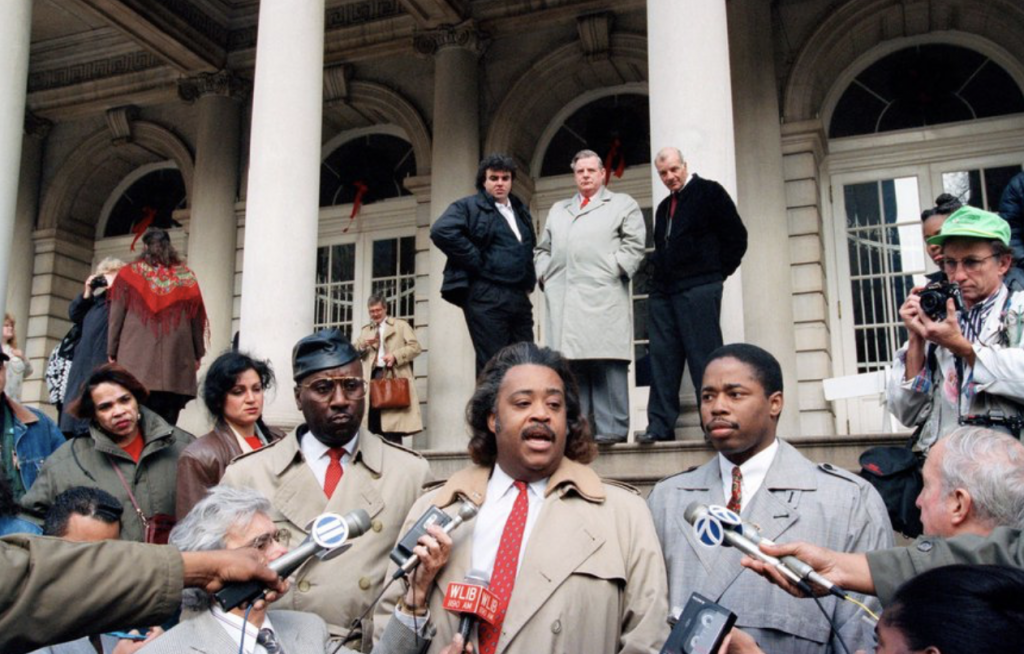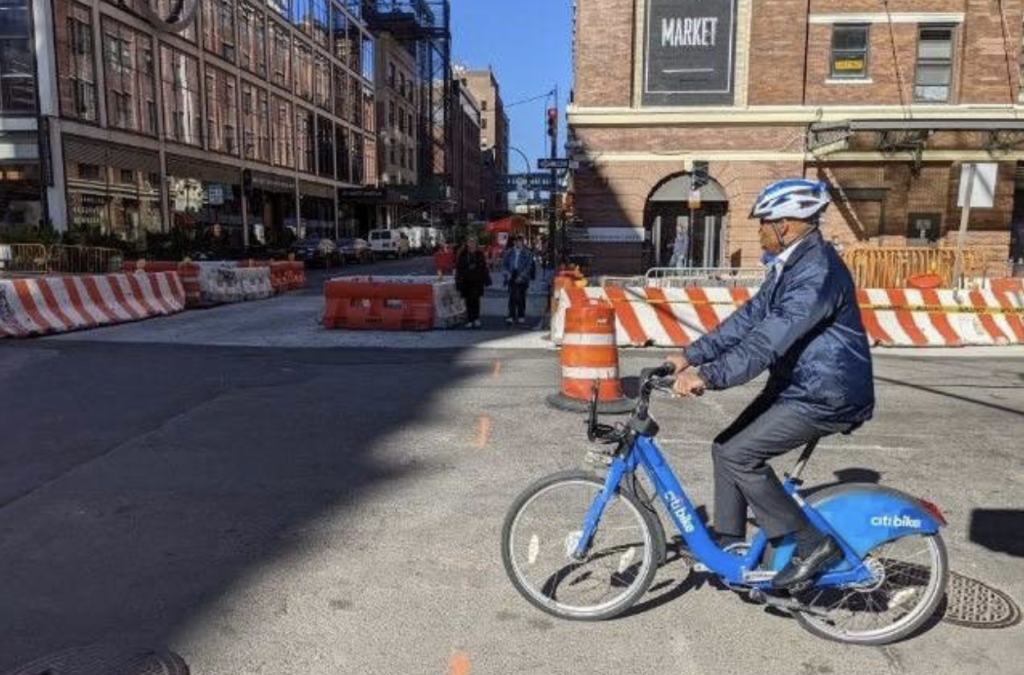What was a foregone conclusion by early July became official on Tuesday night, as Brooklyn Borough President Eric Adams cruised to victory in the general election over Republican Curtis Sliwa to become the next mayor of New York City.
Adams, a former NYPD officer, will be the city’s second Black mayor, after David Dinkins, and the first to have attended a New York City public high school since Abe Beame in the 1970s. His primary campaign weathered a series of questions about his residency (if he, in fact, lives in New Jersey), his personal finances (whether he paid taxes on a co-op he owns), and whether a prospective mayor of New York City should be telling transplants to move away from the city.
Over the next coming weeks, Adams will begin to hire a staff and appoint commissioners, giving some indication as to what kind of mayor he intends to be. While his Democratic primary campaign centered on responding to a rising crime rate and restoring civil order to a city he saw as torn asunder by the COVID-19 pandemic, Adams has spent the last several months only hinting at what he plans to do once in office. Since July, he’s been seen meeting with prominent Democrats and Republicans, fundraising relentlessly, and returning from semi-secret vacations.
To those who have followed his career, Adams’s victory is the culmination of years of street-level political work in outer-borough neighborhoods. It was there he built up popularity among communities that have often felt left out of the conversation regarding the future of New York City.
“The interesting thing about Adams is that while his challengers were putting together these tight coalitions, he just went everywhere else in the city,” said Dr. Christina Greer, a political science professor at Fordham University. “He put together a group of people who felt like they weren’t being heard during the eight years of de Blasio and definitely during the twenty years of Republican control under Giuliani and Bloomberg.”
Adams found much of his electoral strength far from Manhattan and the gentrifying Brooklyn neighborhoods that made up Mayor Bill de Blasio’s base. While other candidates trotted out rafts of policy on housing and education to illustrate their manifold ambitions as mayor, Adams spent a lot of time talking about crime and pest control.
“He was out there talking to the folks, the not politically-connected people, who haven’t been at this table before,” Greer said. “When you talk to people who have lived with rats in their homes, who have been begging elected officials to take an issue like that at all seriously, they don’t know anyone — except for Eric Adams. He hears their issues.”
Adams is from the same community that propelled him to Gracie Mansion.

Born to a single mother in Queens, Adams has said that an act of police violence against him when he was arrested as a teenager is what set him on his path to being a police officer. Adams eventually rose to the rank of captain, and was active in the Grand Council of Guardians, which represented Black law enforcement officers across the state.
In the mid-90s, Adams co-founded 100 Blacks in Law Enforcement Who Care, an organization that called out racist policing by the NYPD during the Giuliani and Bloomberg administrations. (Adams’s current stance on policing includes a limited return of “stop-and-frisk,” the unconstitutional practice that his own organization often rallied against.)
As mayor, Adams will have to navigate a broken relationship between the city’s civilian leaders and a police department that has had little interest in reform under Mayor de Blasio, often flouting his directives and refusing to comply with City Council oversight.
In office, Adams has said he will seek to leverage his own experience as a police officer into prompting reform within the department. During his primary campaign, Adams said he’d be interested in hiring a female police chief. Even before his victory in the general election, Adams had begun a national search for the position, sending out questionnaires to candidates he’d consider for the post.
He said he’d also look into shifting NYPD resources to focus on civilian-led violence interrupter groups, part of an alternative approach to crime reduction.
The Adams campaign did not return any inquiries for this story, but in a 2019 interview, Adams told me that he believes that by intentionally placing police officers from backgrounds similar to the neighborhoods they police, community relations can be improved.
“If I’m in Chinatown, my partner should be Chinese. The commander of that precinct should be of Asian descent,” he said. “Having someone with knowledge of these communities makes you a better police officer.”
Adams left the NYPD in 2006 after he was elected to the State Senate, representing parts of central Brooklyn. While in the senate, Adams continued to press for police reform and was a loud proponent of same-sex marriage as it was pushed through a Republican-controlled chamber in 2011.
But he also gained a reputation for maintaining fierce loyalty to both Hiram Monserrate and John L. Sampson, two embattled Democratic senators who eventually were expelled from the chamber after corruption scandals. Adams himself came under inquiry for his role in steering bids for a casino at Aqueduct, but he emerged from the chaotic and graft-ridden world of Albany mostly unscathed.
Adams was able to change with the times, saidhistorian Joshua Freeman, distinguished professor emeritus at Queens College.
“He’s not driven by a strong ideology. He seems to be quite centrist in his instincts. He’s not committed to one particular spot in the political spectrum the way many politicians are,” said Freeman. “That’s what makes it so difficult to project out from his earlier years in public service.”
Adams consolidation of support among labor groups and in diverse communities across Brooklyn propelled him to the Borough presidency in 2013, where he ran unopposed in the Democratic primary. From that largely-ceremonial perch, Adams spent the next several years laying the groundwork for a run for City Hall — not straying too far from previous successful efforts.
“The coalition that most resembles Adams is the one that elected Dinkins,” said Freeman. “Dinkins had very strong support in the African American community and had strong labor support. That alliance is really the core of the Adams coalition.”
Adams’ mother was a member of DC37, the municipal workers union whose March endorsement helped Adams gain momentum while challengers like Andrew Yang shot to the top of the polls.
While Borough Hall was just a stepping-stone for Adams, it was during that time period where another significant transformation took place for the former thickset police officer. In 2016, Adams was diagnosed with Type 2 diabetes, which prompted him to turn to veganism and a more-regular exercise routine, which he has said has helped reverse his diabetes.

Since then, Adams has relentlessly extolled the virtues of the vegan lifestyle, and helped spearhead “meatless Mondays” in New York City public schools. Adams has said as mayor, s he’ll be biking around the city, working to expand bike lanes to promote exercise and reduce congestion.
The final days of the Mayoral primary campaign were marked by questions surrounding where exactly Adams lives and the veracity of some of his own biography. But despite his extremely narrow victory in June, Adams enters Gracie Mansion (where he said he will live, at least part time), with a particularly strong amount of goodwill from all sides of the political spectrum. So far, he’s indicated that he intends to continue many of current Mayor Bill de Blasio’s policies. And with a competitive governor’s race brewing for this coming June, challengers will be clamoring for his support, increasing the city’s leverage in Albany.
Dr. Greer said the honeymoon phase might last well into the new year, but we’ll soon find out a lot more about what an Adams administration will look like, and who he’s aiming to serve.
Adams will quickly be tested on dicey issues like new contracts for government workers, whether to expand charter schools in the city, and how he navigates events like police killings, hurricanes, and a public health crisis on a scale never before seen.
But Greer said there will be one major difference with Adams — his demeanor.
“Having a mayor who walks around the entire city and is happy to be here? That’s a huge change from what we’ve had. And that might buy him some time. But soon enough he’s going to have to start making some decisions.”
At a campaign rally on Friday, Adams alluded to the baggage and contradictionsthat comes with a life of public service in New York City.
“I’m perfectly imperfect in a city made up of perfectly imperfect people,” he said, to the delight of the crowd.